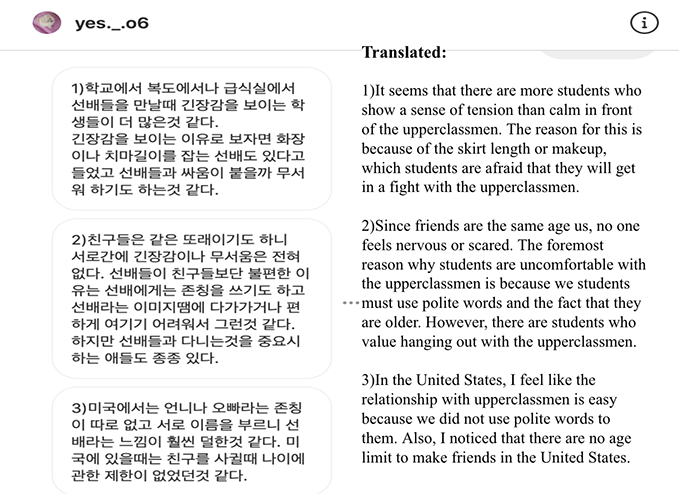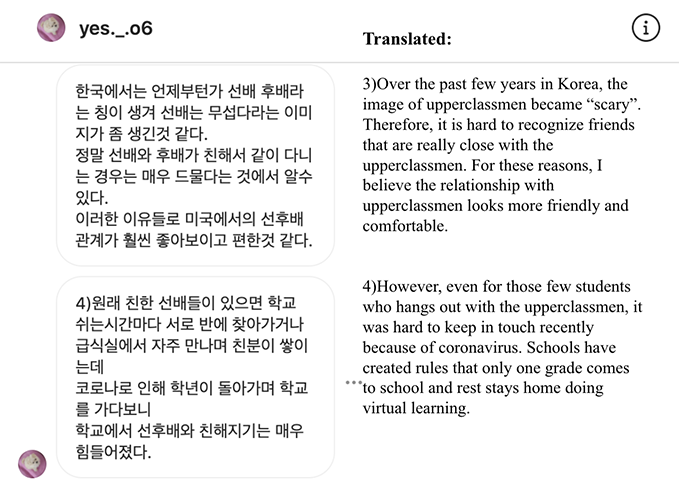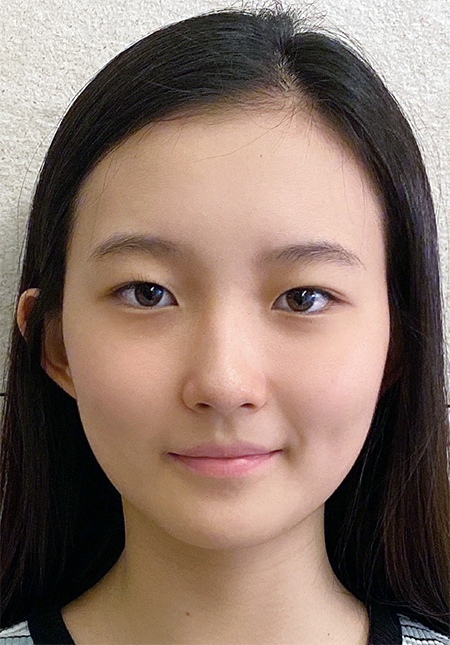School, where everyone starts attending from a young age, is a place to be educated. Not only do students learn at school, but they build new relationships with peers, including with upperclassmen. These relationships vary depending on the country and culture. To explore the different relationships, I focused on two countries, Korea and America, by looking at Korean and American schools. I was able to compare the two cultures by interviewing Yesol Cho, a 15-year-old who experienced both American and Korean school systems.
To give a brief explanation about the two schools' curriculums, Korean public school has 6 years of elementary school, 3 years of middle school, and 3 years of high school, while American school has 5 years of elementary school, 3 years of middle school, and 4 years of high school. Both of these schools’ hours are similar, as the typical day for both American and Korean schools is about 6 to 7 hours long.

When asked about the relationship between the upperclassmen in Korean public school, Yesol without a doubt answered that she feels more nervous than friendly in front of them. “Some of my friends were caught by the upperclassmen because of their makeup and skirt length”. She explained that few of her friends who got caught by their upperclassmen were even forced to be taken up to the rooftop, which is why Yeol and most of her friends are very afraid of them. In contrast, Yesol said that she never had any problems with upperclassmen in the United States. “Back in the States, age limit wasn’t a problem when making friends” and “one of my best friends that I still keep in contact with is two years older than me” were some replies that she stated, which proves the difference between Korean and American students’ relationships with their upperclassmen.

Moreover, the coronavirus pandemic has even made it more difficult for students to get close with upperclassmen. “While I did have a few upperclassmen that I talked to during lunch, now I do not even have a chance to meet any”, Yesol said with disappointment. Even with her friends in the United States, she barely keeps contact with them now, mostly caused by the Coronavirus pandemic. Although she used to visit the United States every summer, she was not able to do this after the coronavirus pandemic, which made them drift apart. However, she did notice that there were some positive effects that students got after the pandemic, especially in Korean schools. “Because we barely met with the upperclassmen, we had no trouble with them this year,” Yesol responded, which she thinks the majority of Korean students benefited from.
At the end of the interview, she said, “To be honest, I was very frustrated and confused when I first came to Korean public school even though I am used to this now”. While she never had any troubles with the upperclassmen in the United States, she was frequently called out by the upperclassmen in Korea. She further stated that the relationship between upperclassmen in the United States is more ethical than Korea, which she hopes that Korean students view the same way as well. She hopes that Korean students will not have to feel tense about upperclassmen. “Since I am the oldest in my school (3rd year of middle school), I always try to be friendly to my underclassmen.” When all Korean students act the same way to their underclassmen as they act to their friends, she believes that building relationships can be much easier for students in Korea.

Amy Park
Grade 10
Seoul Foreign School

